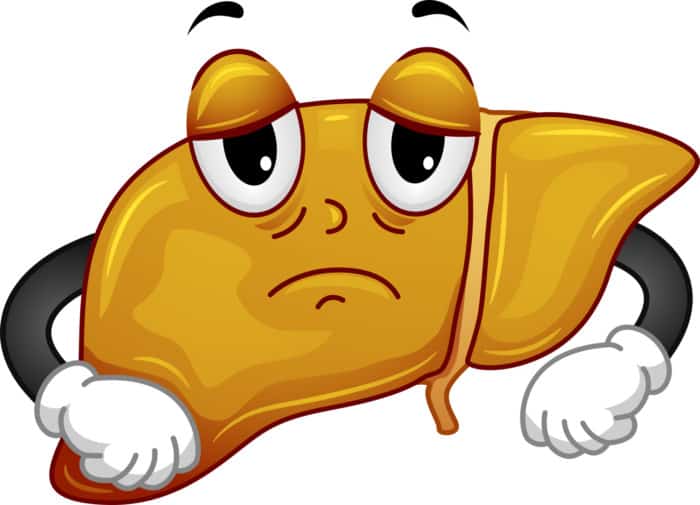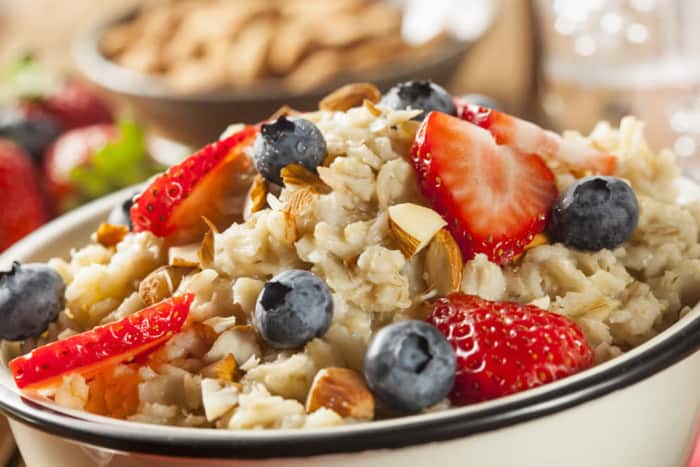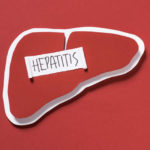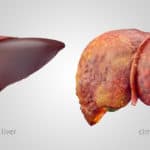Should Someone with Hepatitis C Follow a Fatty Liver Diet?


Controversy has surrounded the dietary habits of individuals with hepatitis C. Some literature points to just following a basic healthy diet while other research points to more specific guidance to individuals with hepatitis C (HCV) regarding a fatty liver diet – one that contains certain foods like orange juice and eliminates other foods such as high cholesterol items.
What Causes a Fatty Liver?
A fatty liver is a liver whose cells have been replaced by fat, rendering them useless.
- There are two types of fatty liver in hepatitis C, one of which is specific to the disease itself.
- Metabolic fatty liver, unrelated to hepatitis C, is usually the result of obesity, raised blood fat levels, insulin resistance and type 2 diabetes. It may co-exist with hepatitis C-induced fatty liver which is fatty infiltration that is directly caused by the presence of the virus (1).
Both forms of fatty liver increase the risk of disease progression in HCV. A fatty liver also reduces the chances of a successful response to treatment and may contribute to the development of fibrosis and liver cirrhosis and cancer (1).
Having a fatty liver is about 2.5 times more common in people with hepatitis C as compared to the general population, with an overall prevalence of about 54% (2). Prevalence rates are variable depending on the population being studied, since having a fatty liver is proportional to the body mass index (BMI) with rising BMIs associated with metabolic fatty liver.
Can Hepatitis C Cause a Fatty Liver?

As early as 2003 it was known that having HCV predisposes one to a greater chance of getting a fatty liver (2). Fatty liver is a common feature of HCV infection and may develop without other risk factors such as obesity. Out of the 6 HCV genotypes, genotype 3 was associated with the greatest incidence of fatty liver (73%) as compared to 51% with other HCV genotypes (2).
Viral clearance is association with the resolution of fatty liver in HCV genotype 3 but not with the other genotypes. In these genotypes, fatty liver and its impact on response to therapy are related to the metabolic syndrome. Thus, the management of obesity and metabolic syndrome in patients with chronic HCV may be crucial to the risk reduction for progression to cirrhosis, fibrosis or cancer (3).
Should You Follow a Fatty Liver Diet if You Have Hep C?
Despite controversy in this area, with many clinicians saying a special diet is not needed in HCV, a review of the literature points to the potential benefits of following a generally healthy diet. For example, a healthy diet one would follow with a fatty liver, avoiding being overweight, and following an exercise program.
Research highlights that most patients are diagnosed at late stages with poor prognosis. Thus, identifying risk factors such as poor diet that may be modified can prevent progression to later stages of fatty liver disease characterized by fibrosis, cirrhosis or even cancer (4). Studies have shown that the patients with a healthier diet have a lower incidence of fatty liver (5).
What to Eat if You Have Hepatitis C

Too often we focus on what not to eat rather than what to include in our diets.
Everything a person eats, or drinks, is transformed into chemicals and energy that involve the liver and allow the body to function optimally.
Research supports the evidence that a poor diet devoid of necessary nutrients when combined with hepatitis C can lead to further liver damage.
Diet also contributes to the problem of obesity, a source of metabolic fatty liver, where the inclusion of high-quality nutrients and the avoidance of excess calories is warranted.
A healthy diet for a fatty liver contains the following:
- Fruits and vegetables: Five servings a day of these foods that are high in antioxidants and other vitamins and minerals are recommended for a healthy, well-balanced diet. One study showed an increase in antioxidant capacity and decreased inflammation and cholesterol in blood of HCV patients consuming 500 ml of orange juice per day. This was indication that orange juice may be beneficial as a source of low glycemic antioxidants (6). Orange juice also decreased levels of the liver enzymes ALT and AST.
- Proteins: Replacing some of the carbohydrates and simple sugars in the diet with protein is a good way to stabilize blood sugar. Many hepatitis C patients often have problems with blood sugar since HCV induces an insulin resistant state where sugars are not processed optimally – and type 2 diabetes may even develop. High iron foods from red meats should be kept at a minimum, as excess iron may be harmful to HCV patients (7). Proteins should emphasize low fat cuts of turkey, fish, tofu, beans and cheese.
- Dairy: 2-3 servings of dairy emphasizing probiotic containing foods such as yogurt are preferred. Dairy products provide protein, calcium, and vitamin D. Low fat or fat-free versions of dairy are the best choices for people with hepatitis C.
- Complex, low glycemic carbohydrates: Focus on brown rice, oatmeal, whole oats, whole wheat, wild rice, and whole rye. Why focus on low glycemic? Studies have shown that total fasting blood sugar is higher in HCV-infected patients than healthy controls. Insulin resistance is also present as a result of the infection (8). Following a low glycemic diet can prevent the development of diabetes and help maintain stable blood sugar levels in hep C patients. Prevalence of insulin resistance in HCV patients ranges from 30-70%, so clearly diet is an important feature in this illness (8).
- Fats: The inclusion of polyunsaturated and monounsaturated fats is preferable over saturated fats – and trans fats should be avoided. The hepatitis C virus feeds on cholesterol, with the cholesterol increasing viral replication. Saturated fat is used in the body to manufacture cholesterol, so following a low saturated fat, low cholesterol diet may be beneficial to HCV patients (9).
- Vitamins: Research shows that vitamin D deficiency is common among those with liver disease regardless of cause. Over 70% of hepatitis C patients show some form of vitamin D deficiency, which is related to treatment success and viral load. Six weeks of repletion therapy has been shown to play an important role in the reversal of liver fibrosis and a decrease in the liver enzymes AST and ALT (10).
What to Avoid if You Have Hepatitis C
If you have HCV, essentially you want to avoid excessive alcohol, trans fat, saturated fats, cholesterol, high glycemic foods, sugary foods and excessive calories.
The 3 Best Herbs to Fight a Fatty Liver

- Milk Thistle inhibits the inflammatory actions caused by the hepatitis C virus. It can also improve the regeneration process and normalize the liver enzymes by its action on protein synthesis. Furthermore, it has antioxidant actions and reduces free radical production with anti-fibrotic activity – possibly even acting as a toxin blockade agent by inhibiting the binding of toxins to liver cell membranes (11).
- Chicory has been used as a hepato-protectant and shows its effects by a reduction of the liver enzymes AST and ALT. It has a positive effect on alleviating oxidative stress and liver injury. Chicory has also been shown to have anti-diabetic activities, potentially aiding in the support of elevated blood sugars commonly seen in HCV patients.
- Artichoke has been shown to be beneficial in reducing oxidative stress in control of elevated blood lipids and normalization of abnormal lipid profiles. Recent studies have shown artichoke to be effective on visceral fat levels and liver fat accumulation on animals fed a high fat diet. It also has hypoglycemic effects (11).
Natural Wellness’s Clinical LiverSupport contains milk thistle, chicory and artichoke!
Conclusion
Literature supports the fact that hepatitis C patients may benefit from instructions regarding their diet. It also supports the adoption of a healthy diet in patients with HCV who want to benefit optimally from treatment, avoid fibrosis and other progressive natures of the disease left untreated or in relapse (12).
- Steatosis. (n.d.) Hepatitis C Trust. Retrieved 4/29/20 from http://www.hepctrust.org.uk/information/impact-hepatitis-c-liver/steatosis
- Asselah, T, Boyer, N., Marcellin, P. (2003). Steatosis in hepatitis C. Current Hepatitis Reports, 2(137):144. Retrieved from http://www.natap.org/2004/jan/012104_05.htm
- Bondini, S., Younossi, ZM. (2006). Non-alcoholic fatty liver disease and hepatitis C infection. Minerva Gastroenterol Dietol, 52(2):135-43. Abstract retrieved from https://www.ncbi.nlm.nih.gov/pubmed/16557185
- Yang, W., Zeng, X, Ning Z, Zhao, Q., Tan, Y., Gao, J and Xiang Y. (2020). Diet and liver cancer risk: a narrative review of epidemiological evidence. British Journal of Nutrition. Abstract retrieved from https://doi.org/10.1017/S0007114520001208
- Yoo, E.R., Kim, D., Vazquez-Montesino, L.K., Escober, J.A., Li, A.A., Tighe, S P., and Ahmed, A. (2020). Diet quality and its association with nonalcoholic fatty liver disease and all cause and cause-specific mortality. Liver International, 40(4). Abstract retrieved from https://doi.org/10.1111/liv.14374
- Goncalves, D. Lima, C., Ferreira, P., Costa, P., Costa, A. and Cesar, T. (2017). Orange juice as dietary source of antioxidants for patients with hepatitis c under antiviral therapy. Food and Nutrition Research, 61. Retrieved from https://foodandnutritionresearch.net/index.php/fnr/article/view/1158
- Seymour, T. (2018, January 25). What to eat if you have hepatitis C. Medical News Today. Retrieved 4/29/2020 from https://www.medicalnewstoday.com/articles/320727
- Yinping, L, Wang, X., Yu G., Sun, H., Ly, J. and Gao, X. (2019). The association of hepatitis C virus infection status with serum glucose levels. BMC Gastroenterology, 19(86). Retrieved from https://doi.org/10.1186/s12876-019-1003-3
- Wang, X, Tanaka, N, Hu, X., Kimura T., Lu, Y., Jia, F., and Aoyama, T. (2019). A high-cholesterol diet promotes steatohepatitis and liver tumorigenesis in HCV core gene transgenic mice, Arch Toxicol, 93(6):1713-1725. Abstract retrieved from https://www.ncbi.nlm.nih.gov/pubmed/31004178
- Komolmit, P., Kimtrakool, S., Suksawatamnuay, S., Thanapirom, K., Chattrasophon, K., and Poovorawan, Y. (2017). Vitamin D supplementation improves serum markers associated with hepatic fibrogenesis in chronic hepatitis C patients: a randomized, double-blind, placebo-controlled study. Scientific Reports, 7:8905. Retrieved from https://doi.org/10.1038/s41598-017-09512-7
- Sharifi, M. S., Bakhshael, S. (2017). Pharmacological effect of seven medicinal plants as a traditional preparation. Biological Science. Retrieved from https://www.iioab.org/articles/IIOABJ_8.S2_8-12.pdf
- Loguericio, C., Federico, A., Masarone, M., Torella, R., Bianco, C. Persico, M. (2008). The impact of diet on liver fibrosis and on response to interferon therapy in patients with HCV-related chronic hepatitis. American Journal of Gastroenterology, 103(12):3159-3166. Abstract retrieved from https://journals.lww.com/ajg/Abstract/2008/12000/The_Impact_of_Diet_on_Liver_Fibrosis_and_on.31.aspx







